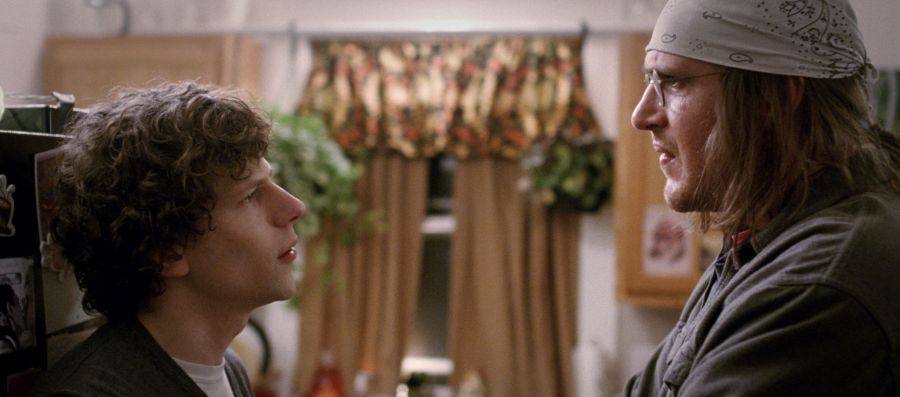David Lipsky sat in Stevenson Hall, rapidly scribbling notes.
Even though Lipsky had just published a novel, there he was amongst Advanced Creative Writing: Prose students, most of whom were eight to 10 years his junior. Some of the students were scribbling as furiously as he was, writing down choice tips from their professor.
“When I first got off the airplane in March of 1996, that first day I went to his Prose class at ISU,” Lipsky recounted. “And the students were excited and they knew something cool was happening to their professor but they loved him anyway.”
What was happening was associate professor David Foster Wallace had published an epic and audacious novel, which had been sucking up much of the air in the literary community. Infinite Jest, published in February of that year, had entered a sixth printing by the time David Lipsky landed in Bloomington-Normal on assignment from Rolling Stone.
For five days that March, David Lipsky shadowed Wallace, at the writer’s home, at book readings, and during transport as the novelist traveled on the last leg of the Infinite Jest promotional book tour. The reporter captured hours of audio on an omnipresent cassette recorder. The tapes ended up as his source material for the memoir Although Of Course You End Up Becoming Yourself: A Road Trip with David Foster Wallace. That memoir has been adapted into the film The End of the Tour with actor Jesse Eisenberg portraying Lipsky and Jason Segal taking on the role of David Foster Wallace.
“He didn’t want me tape recording so I took very careful notes.”
The End of the Tour will be shown at the Normal Theater over Homecoming weekend, playing October 23–25 at 7 p.m. It comes out on Digital HD on October 20 and Blu-ray on November 3.
The Rolling Stone article was never published; upon his return from Bloomington-Normal Lipsky was promptly dispatched to cover a more likely story for the magazine: the drug overdose of a rock star.
As depicted in the film, Lipsky dug out the tapes after learning of Wallace’s suicide in 2008. His goal was to use the unfiltered thoughts of his interview subject to show the human side of the “generational talent” he’d met in 1996.
“I thought that the best way to do a book about him was to take the five days that we’d been together that had been recorded and more or less just to run the transcripts,” Lipsky said. “It would just be him telling his own story.”
‘No reporting’ rule
Not on those tapes was any audio from the Prose class Lipsky surveyed on the first day of his visit. Wallace set down a “no recording” rule during the reporter’s visit to the classroom. For the professor, the business of teaching was separated from the promotional duties of his book.
“He didn’t want me tape recording so I took very careful notes,” Lipsky said. He added that Wallace himself would bring a notepad and not a recorder when commissioned to write profiles and feature pieces for magazines including Harpers and Premiere. “When you take notes on things, something I think about the actual muscle of having to recreate in ink while it’s going on makes you remember more clearly.”
In the classroom Lipsky was struck by the professor’s informal approach.
“He had the ability to be brilliant but also being informal,” Lipsky said. “Sometimes when people speak to us in a brilliant way we somehow feel that their brain, or their words, are kind of wearing a jacket and tie. And that wasn’t a problem that he had.”
In The End of the Tour, Wallace is presented as worrying that the level of celebrity that accompanied his success would have a negative effect on both how thought of himself and how he was seen by others.
It’s a concern that Lipsky didn’t see in eyes of the Illinois State students he met in 1996.
“They’d already loved him before because he’s a great professor and he is a stunningly electric person to have in the room with you.”
Wallace’s reputation has only grown in the years since the end of the Infinite Jest tour. While still teaching at Illinois State, Wallace was awarded a MacArthur Genius Grant in 1997.
Collections of his nonfiction work such as A Supposedly Fun Thing I’ll Never Do Again gained the writer an additional readership of fans that did not necessarily have the endurance to make it through his more lengthy novels. In 2005, Time magazine named Infinite Jest one of the “100 best English-language novels published since 1923.”
Steve Fast ’94 is a Department of English graduate who now works for the University of Illinois Press. He also hosts The Steve Fast Show on WJBC AM-FM. He lives in Bloomington.
Read more about Wallace’s connection to Illinois State:


